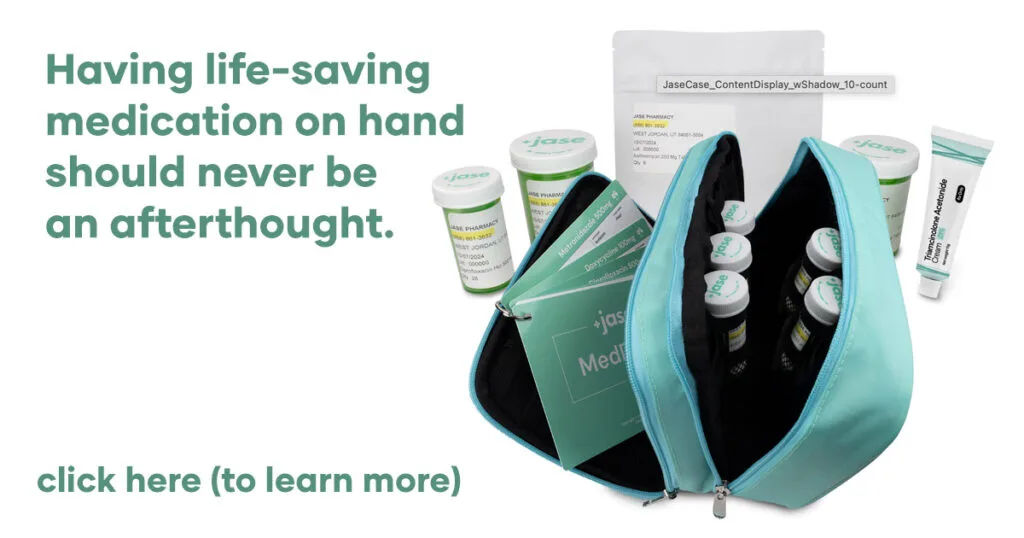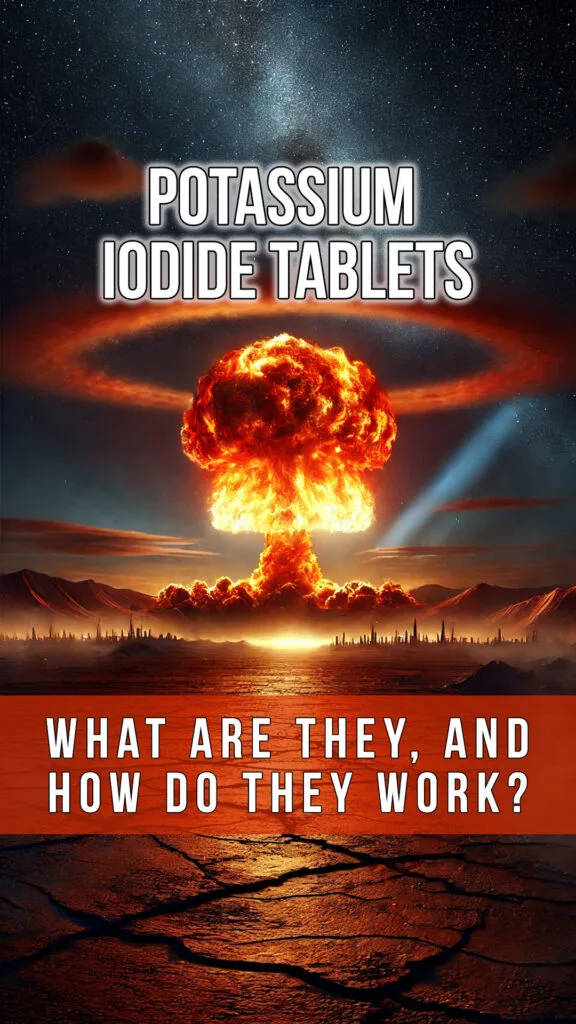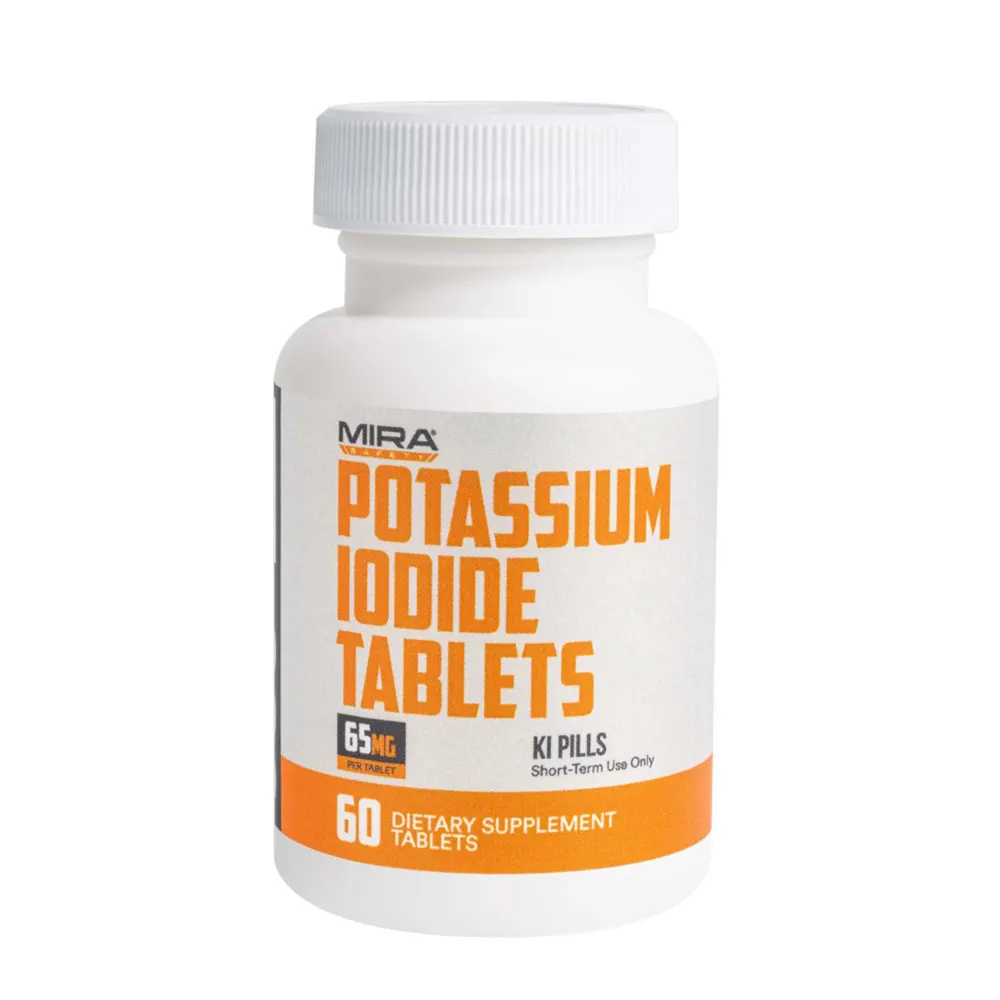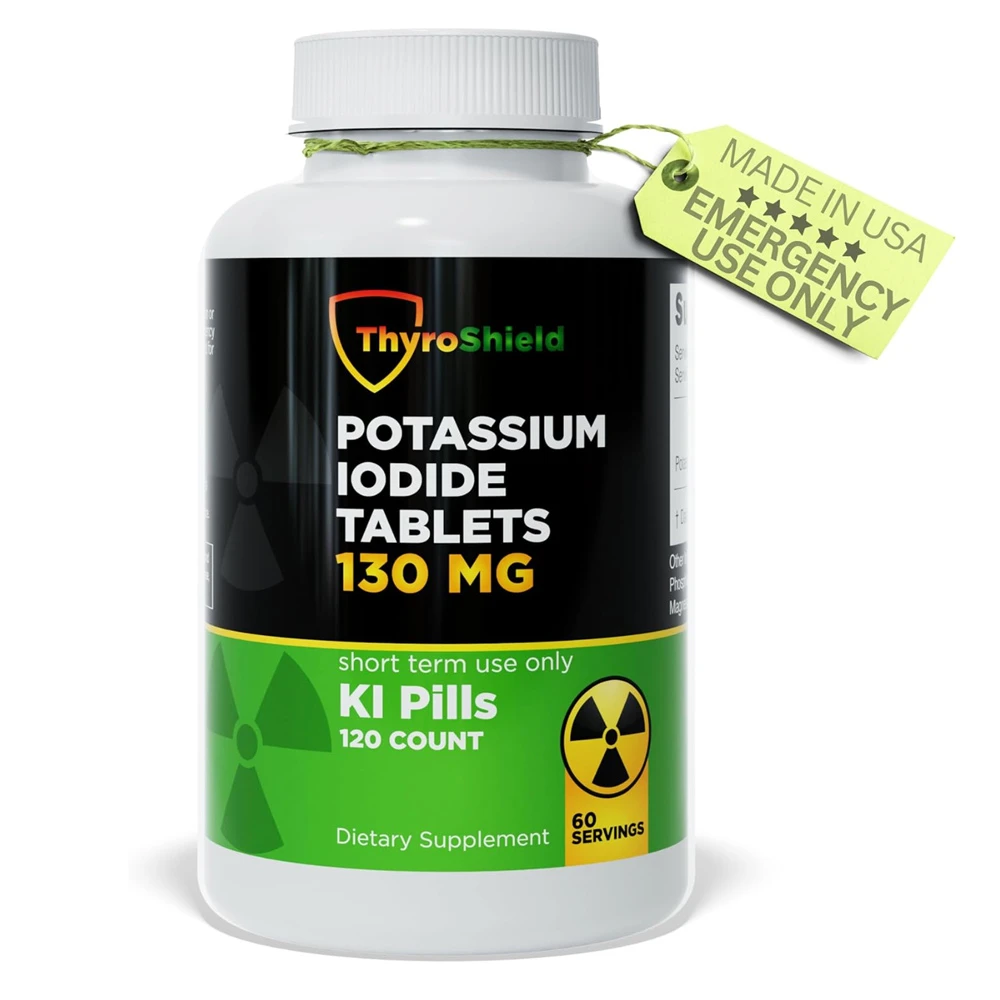In an era marked by rapid technological advancements and geopolitical tensions, the possibility of a nuclear or radiological emergency is a topic that, while unsettling, cannot be ignored. As responsible individuals, it’s important to understand the risks and the measures we can take to protect ourselves and our loved ones.

One such protective measure is the use of potassium iodide tablets. But what are they, and how do they work?
Understanding the Threat
We live in unpredictable times. A nuclear accident or explosion can release various radioactive elements into the atmosphere, one of which is radioactive iodine. This particular isotope poses a significant risk to our health, primarily because of its interaction with the thyroid gland.
Situations That May Require Potassium Iodide
- Nuclear power plant accidents
Meltdowns or containment breaches can release large amounts of radioactive iodine, especially in older or poorly maintained facilities. - Strategic nuclear weapon detonation
A large-scale explosion from a groundburst nuclear bomb can produce radioactive fallout containing iodine-131. - Tactical nuclear strikes
Smaller, battlefield-deployed nukes may still generate enough radioactive iodine to pose a threat to civilians in the fallout path. - Dirty bombs using medical isotopes
Terrorist devices that spread radioactive materials like iodine-131 taken from hospitals or research centers. - Targeted attacks on nuclear facilities
Strikes on reactors, fuel storage sites, or waste containment areas can result in a release of iodine-rich fallout. - Accidental or intentional reactor sabotage
Cyberattacks, insider threats, or coordinated physical sabotage at a reactor could cause a critical incident involving iodine-131. - Severe transport accidents
Collisions or disasters involving vehicles transporting radioactive medical materials could release iodine into populated areas.
The Thyroid Gland and Radioactive Iodine
The thyroid gland, located in the neck, plays a vital role in our body’s metabolism, growth, and development. It has a natural affinity for iodine, an essential element it uses to produce thyroid hormones. In the event of a nuclear incident, the thyroid can absorb the released radioactive iodine, leading to thyroid cancer or other related diseases.
The Protective Role of Potassium Iodide Tablets
This is where potassium iodide (KI) tablets come into play. When taken as directed, these tablets saturate the thyroid with non-radioactive iodine. By doing so, they effectively block the thyroid’s ability to absorb any radioactive iodine from the environment. It’s a simple yet effective mechanism: a saturated thyroid has no room to absorb the harmful radioactive variant.
Potassium Iodide Recommendations:
Purchase online: MIRA Safety Potassium Iodide (KI) Tablets
OR, this one on: Amazon
Get Potassium Iodide tablets (added) to your JASE CASE:
You can now secure essential prescription medications for emergencies, without a traditional pharmacy visit. Through Jase Medical’s MedGuide portal, you can order a long-term emergency supply of critical antibiotics and other prescription drugs online. This includes medications for infections, respiratory illness, and other common conditions that could be difficult to treat during a disaster or supply chain disruption.
They also offer potassium iodide tablets (as an add-on to your case)!

Potassium Iodide FAQ: What You Really Need to Know
1. What exactly does potassium iodide do?
It fills your thyroid with stable iodine so it cannot absorb radioactive iodine released during nuclear fallout.
2. Does potassium iodide protect against all types of radiation?
No, it only protects the thyroid from radioactive iodine. It does not shield you from gamma rays, cesium-137, or other radioactive particles.
3. When should I take it?
Ideally 1 to 2 hours before exposure or as soon as possible afterward. The sooner it’s taken, the more effective it is.
4. How long does one dose protect you?
One dose protects the thyroid for about 24 hours.
5. Who should take it in a nuclear emergency?
Children, teens, pregnant or breastfeeding women, and adults under 40 are the highest priority. Older adults usually do not need it unless exposure is very high.
6. What if I don’t take potassium iodide?
Your thyroid may absorb radioactive iodine, increasing your risk of thyroid cancer, thyroid inflammation, or long-term dysfunction.
7. Are there short-term side effects from not taking it?
Yes. Acute thyroid damage can cause throat swelling, pain, difficulty swallowing, or thyroiditis.
8. What’s the shelf life of potassium iodide tablets?
Labeled shelf life is usually 3 years, but they can remain effective for up to 10 years if stored in a cool, dry place.
9. Can Lugol’s iodine be used instead?
In emergencies, it may be used, but it carries a higher risk of toxicity and is harder to dose correctly. It is not FDA-approved for radiation protection.
10. Should I take potassium iodide if a nuclear bomb goes off somewhere in America?
Only if you are downwind and within roughly 50 miles of the fallout path, and radioactive iodine is involved. Wait for public health guidance unless communication is down.
11. What factors affect whether radioactive iodine will be released?
It depends on the type of explosion, whether a nuclear reactor is involved, the bomb’s yield, and whether the detonation is airburst or groundburst.
12. How could a dirty bomb contain radioactive iodine?
Radioactive iodine is used in medical treatments and could be stolen from hospitals or labs, then dispersed using a conventional explosive device.
Best choice: MIRA Safety Potassium Iodide (KI) Tablets
In the event of a nuclear accident or explosion, protecting your thyroid from exposure to radioactive iodine is critical. MIRA Safety Potassium Iodide (KI) Tablets are an essential addition to any emergency preparedness kit. Designed to flood the thyroid with safe, non-radioactive iodine, these tablets block the absorption of harmful radioactive iodine, significantly reducing the risk of thyroid damage and cancer. Whether you’re preparing for an emergency at home or planning for a potential radiological event, KI tablets provide a simple yet powerful safeguard for you and your family.
Why Choose MIRA Safety KI Tablets?
MIRA Safety KI Tablets are FDA-approved and formulated for maximum effectiveness during radiation emergencies. Each tablet delivers the recommended dose of potassium iodide to saturate your thyroid gland, preventing it from absorbing radioactive iodine from the environment. Compact and portable, these tablets are easy to store and transport, making them ideal for inclusion in go-bags, emergency kits, or home preparedness supplies. With a long shelf life and clear dosage instructions, MIRA Safety KI Tablets are a trusted solution for nuclear preparedness.
The Importance of Potassium Iodide During Radiation Exposure
During a nuclear event, radioactive iodine (I-131) can be released into the atmosphere, posing serious health risks. Your thyroid gland, which plays a vital role in regulating your body’s metabolism and hormone levels, naturally absorbs iodine. Without protection, it can absorb harmful radioactive iodine, leading to thyroid cancer and other complications. MIRA Safety KI Tablets work by saturating the thyroid with stable iodine, effectively blocking the uptake of radioactive iodine and providing critical protection during radiological emergencies.
Be Ready for Radiation Emergencies
Preparedness is key to protecting your health during unexpected emergencies. MIRA Safety Potassium Iodide (KI) Tablets offer peace of mind with a proven, FDA-approved solution to mitigate the risks of radioactive iodine exposure. By adding these tablets to your emergency supplies, you ensure that you and your loved ones are ready for any radiation emergency. Trust MIRA Safety for reliable, high-quality preparedness solutions that help you stay safe in uncertain times.
Pin it




Joanie Guthrie
Sunday 5th of January 2025
I had 2/3 of my thyroid removed would this still be something I would need to take.. I am on 100 MCG of Synthroid to replace my remove thyroid ...thank you...
sandy
Friday 5th of January 2024
Is this a one and done pill or do you continue to take a daily dose
Rob Benson
Saturday 6th of January 2024
Do not take any longer than 2 weeks. The CDC recommends 130mg for adults, 65mg for children, 32.5mg for small children. Each tablet contains 65mg and so 2 would be for an adult and 1 would be for a child. Then broken in half for small children. One serving per day.
Ron Nichol
Wednesday 3rd of January 2024
How often do you have to turn over your supply of potassium iodide tabs? I.E. do they have an expiry date? Thanks
Rob Benson
Saturday 6th of January 2024
From the manufacturer: The bottle states 3 years for QA purposes. However, The NRC has stated that the shelf life of Potassium Iodide Tablets can be extended greater than 10 years due to the inherent stability of iodine salt mineral supplements.
sean
Wednesday 20th of December 2023
what if we have hypothyroidism? is it safe to use?
Rob Benson
Friday 22nd of December 2023
Potassium iodide is primarily used to protect the thyroid gland from radioactive iodine by saturating it with non-radioactive iodine. In individuals with hypothyroidism, the thyroid gland's function is already compromised, and introducing high doses of iodine (as found in potassium iodide tablets) can further affect thyroid function.
jada sarfate
Tuesday 31st of October 2023
How do we dose children?
Elena
Saturday 30th of December 2023
@Rob Benson, can people that are allergic to shellfish use this?
Rob Benson
Tuesday 31st of October 2023
The CDC recommends 130mg for adults, 65mg for children, 32.5mg for small children. Also: the product you purchase should have instructions on use by age.